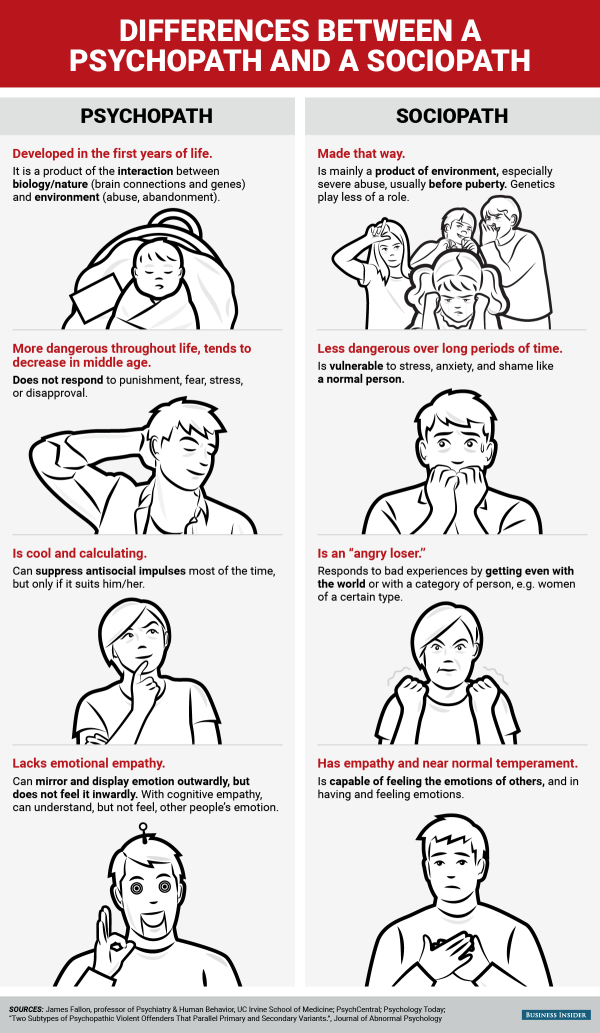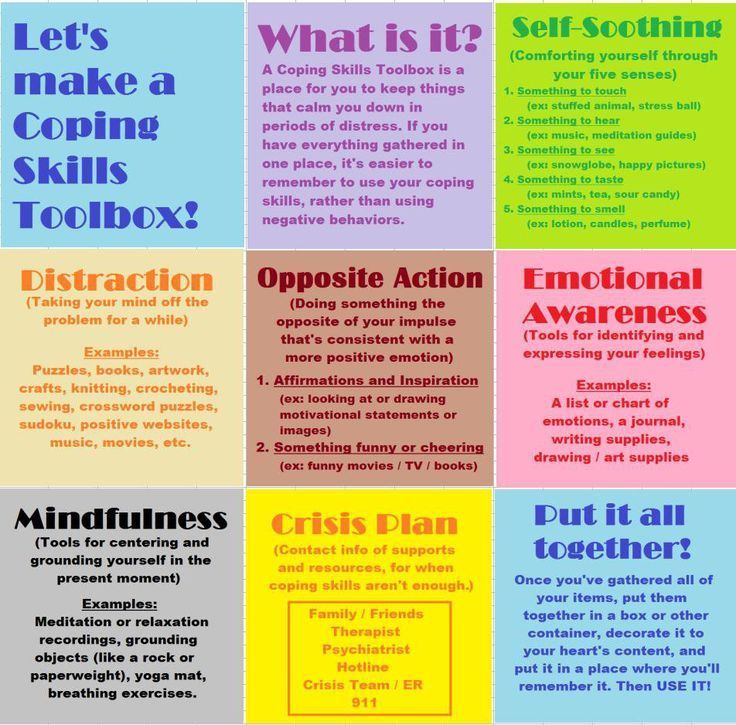Empath vs sociopath
Empath vs. Sociopath: What's the Difference?
Do you know someone who always seems to have an ear for the feelings of others and a knack for understanding and relating to them? Chances are you’re dealing with an empath.
What about that friend or acquaintance who always seems to be in the wrong place at the wrong time, crossing boundaries and causing drama? They might be a sociopath.
So what’s the difference between these two types of people? Let’s explore.
What Is an Empath?
Empaths are people who have the ability to sense and feel what others are feeling. They are sometimes called “emotional sponges” because their own emotions can be easily influenced by those around them. They can sense this intuitively or through physical cues, such as facial expressions, body language, and tone of voice.
An empath may also have a strong desire to help others, even if it’s not appropriate or helpful for them to do so. They are not necessarily able to understand the source of these emotions, but they can feel them and often find them difficult to deal with.
In addition, empaths tend to be highly sensitive and caring people who want to help others but sometimes have difficulty doing so because they feel so many emotions from others.
Empaths also tend to be good listeners who understand people better than most because they know what it feels like to be in someone else’s shoes. Furthermore, empaths need time for themselves each day to recharge their batteries and balance the emotions they pick up from others throughout the day.
What Is a Sociopath?
A sociopath is someone who lacks empathy, or the ability to understand and identify with other people’s emotions. They may have difficulty forming healthy relationships and are often manipulative and deceitful.
They may also appear to be very friendly and caring, but these feelings are only faked. Sociopaths have a tendency to hurt people who try to help them and use their good nature against them.
Also, sociopaths can be highly intelligent and charming, but they use these traits to manipulate and control others.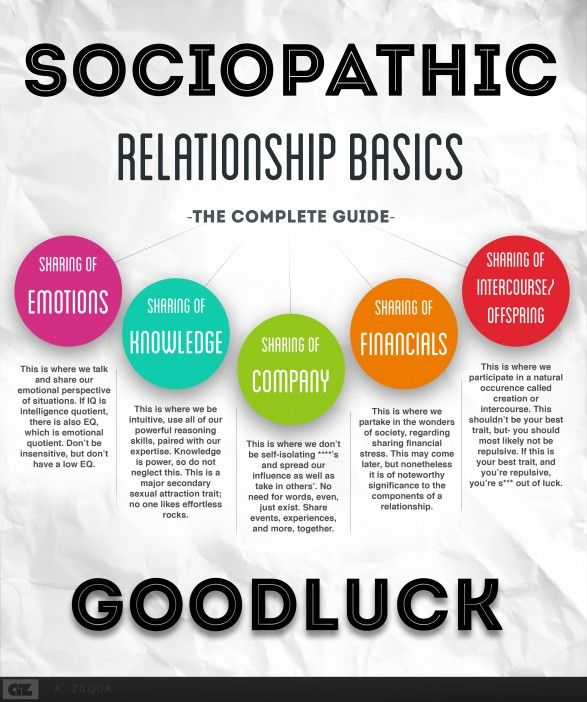 They don’t care if they hurt others or get caught doing bad things – they’re only interested in themselves.
They don’t care if they hurt others or get caught doing bad things – they’re only interested in themselves.
The behavior of sociopaths can be very disruptive in society, as they tend to disregard social norms and laws, and often do whatever they want without regard to the consequences – they are more prone to antisocial behavior such as violence and criminal activity.
In addition, sociopaths may also be unable to hold down a stable job because they lack the ability to relate well with others or follow instructions from supervisors or managers.
Empaths Feel Compassion for Others’ Suffering, While Sociopaths Often Take Advantage of Others’ Suffering
Empaths are often noted for their ability to feel compassion for others. They tend to be very in tune with the feelings of others, and can easily understand and relate to them. This is often out of genuine concern and care, as empaths feel compelled to help those who are suffering. They want to make a difference in the world and often use their unique abilities to do so.
In addition, they feel compassion for the suffering of others and can often relate to them on a deep level. This can make them very good at helping and supporting others, and they often make great therapists or counselors.
Sociopaths, on the other hand, often exploit the suffering of others for their own gain. They may be less sensitive to the feelings of others and may not be as motivated by compassion.
Instead, they may see others as pawns to be used for their own advantage. This often leads to manipulative behavior and a lack of empathy.
Empaths Can Be Emotionally Sensitive, While Sociopaths Are Emotionally Insensitive
Empaths often sense when someone is upset or uncomfortable, and they have a natural ability to connect with people on an emotional level. The pain and suffering of those around them can touch them deeply, and they may find it difficult to detach themselves from their feelings.
Sociopaths, on the other hand, may be completely unaware of other people’s feelings, or they may simply not care. They may also not be able to understand why other people are upset or why they’re retaliated against for their behavior because they don’t feel the same emotions as other people do.
They may also not be able to understand why other people are upset or why they’re retaliated against for their behavior because they don’t feel the same emotions as other people do.
Moreover, they may often leave a trail of pain and destruction in their wake, and many people may find them difficult to deal with. While empaths strive to build meaningful relationships with others, sociopaths care only about themselves and their own needs, without regard for the feelings of others.
Empaths Listen Well When Others Talk About Their Feelings While Sociopaths Often Dismiss These Things as Irrelevant
Empaths are often exceptional listeners. They tune into the feelings of others when they talk about their feelings, wants, and needs as a way of showing that they care about others and that they want to help them.
Empaths are able to do this because they can easily put themselves in the shoes of others. They understand that everyone has different emotions and experiences, and they are interested in hearing what others have gone through.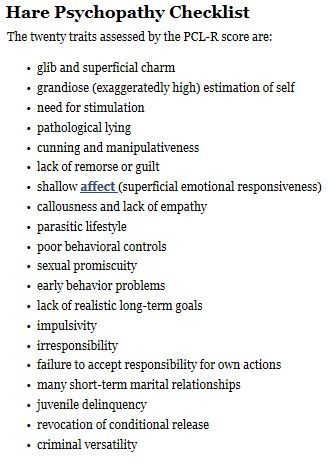
Sociopaths, on the other hand, often dismiss these things as “irrelevant” or “too sensitive.” They may not be interested in hearing about the feelings of others, or they may see them as weaknesses. Sociopaths often cannot understand or relate to the feelings of others and therefore see no point in paying attention to them.
Sociopaths Tend Not to Care About the Consequences of Their Actions; Empaths Do Care About the Consequences of Their Actions
Sociopaths tend not to think about the other person involved in their schemes, or they may not care if those people get hurt. They focus more on their own needs and desires, which can often lead them to overstep boundaries and cause drama.
Empaths, on the other hand, are very caring people. They want to avoid causing pain or suffering to anyone, and they are often very conscientious about their words and actions. They care about the consequences of their behavior and often work to ensure everyone is happy and safe.
Empaths Are More Likely to Take on Other People’s Problems as Their Own While Sociopaths Usually Do Not
Empaths are more likely to feel a sense of responsibility to help others.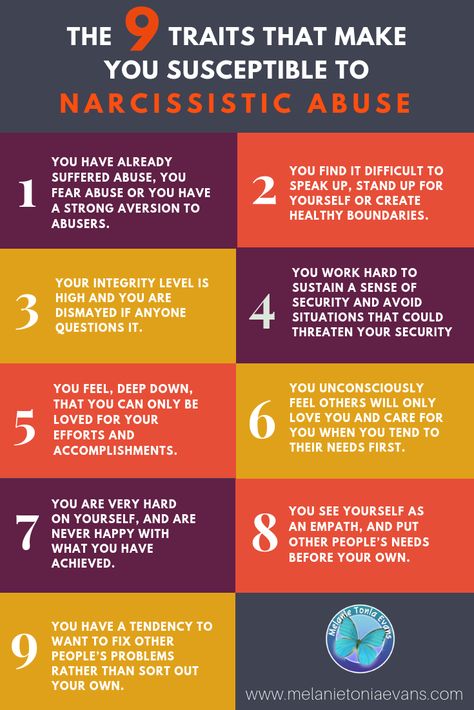 They often have a hard time separating their own feelings from those of others, and often have a hard time saying no.
They often have a hard time separating their own feelings from those of others, and often have a hard time saying no.
This can be a good thing, as it makes them compassionate and caring individuals. However, it can also be a problem because they often end up taking on too much responsibility and become overwhelmed.
Sociopaths usually don’t do this because they don’t care about other people’s problems. Instead, they tend to focus on their own needs and desires and see other people as objects they can use to achieve their own goals.
Can an empath be a narcissist?
An empath can be a narcissist, but that’s not usually the case. Narcissists are usually selfish and egocentric, while empaths are often caring and sensitive to the needs of others.
How can empaths set boundaries?
One of the biggest challenges for empaths is learning how to set boundaries. This can be difficult, especially if they’re used to always putting others first. It’s important for empaths to learn how to take care of themselves, and this includes setting boundaries to protect their own energy.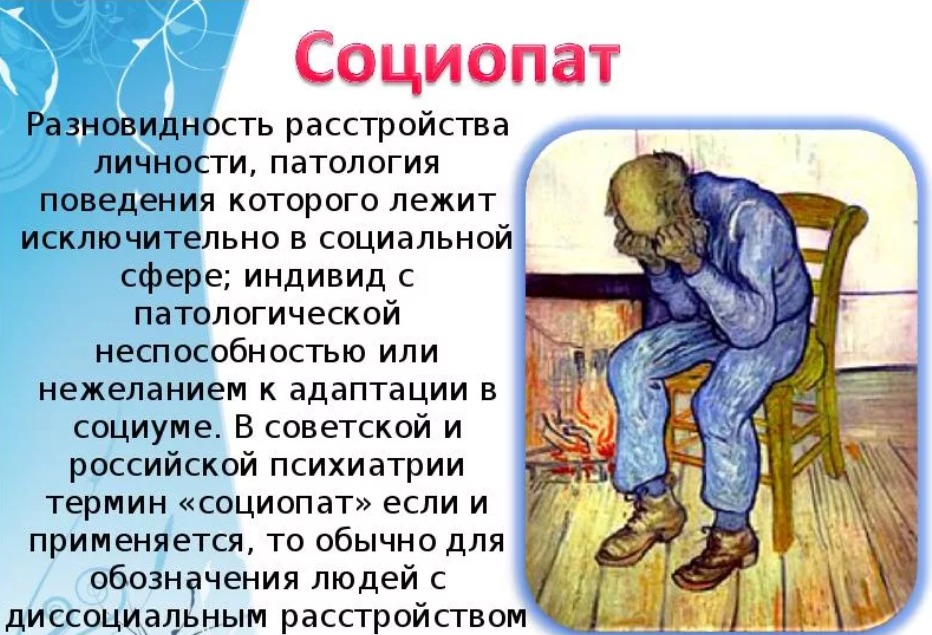 Here are a few things empaths can do to set boundaries:
Here are a few things empaths can do to set boundaries:
Establish what your limits are and communicate them with others. Let others know when you’re not available or when you need some time to yourself.
Use self-care practices like meditation, yoga, or journaling to maintain your energy level.
Create a physical space for yourself – whether that means having your own room, distance from technology, or time for yourself each day.
Put yourself first occasionally. It’s okay to say no, even if it’s something you usually wouldn’t hesitate to do.
What happens when an empath gets angry?
When an empath gets angry, they can exhibit some pretty intense behavior. They may feel like they’re about to explode and may have difficulty controlling their emotions. They may lash out at the people around them or become very quiet and withdrawn.
An empath’s anger can be very destructive and damaging, both to themselves and to those around them. In some cases, however, empaths may experience overwhelming feelings of guilt or shame after getting angry and feeling that they’ve done something wrong.
In some cases, however, empaths may experience overwhelming feelings of guilt or shame after getting angry and feeling that they’ve done something wrong.
Can a sociopath love someone?
Sociopaths are capable of loving someone, but it’s a very different kind of love than that experienced by most people. It’s more of a possessive, obsessive love that can be quite manipulative. They may shower their partners with attention and affection when it suits them, but can quickly become cold and dismissive when they no longer need the person.
Also, sociopaths don’t usually feel genuine emotions like empathy or compassion, so their love is based on what benefits them the most. This often means that their relationships are very one-sided – the sociopath gives and expects a lot in return, and quickly becomes enraged if they don’t get what they want.
While sociopaths can sometimes form seemingly normal relationships, their lack of empathy and manipulation usually leads to a lot of turmoil and chaos. Ultimately, it’s very difficult for someone who isn’t a sociopath to have a healthy relationship with them.
Ultimately, it’s very difficult for someone who isn’t a sociopath to have a healthy relationship with them.
Conclusion
In summary, empaths are able to understand other people’s emotions, and they work hard to regulate their own emotions to avoid being overwhelmed by them when they’re around other people who may be experiencing strong emotions themselves.
Empaths are also more likely to be trusting, while sociopaths are more likely to be suspicious of everyone around them. So while an empath may believe that all people have good intentions, a sociopath may not trust anyone at all.
However, just because someone doesn’t feel your pain doesn’t necessarily mean they’re a sociopath. There are many reasons why people might not respond emotionally to the problems of others: Maybe they’re in denial about their own feelings; maybe they’re just not good listeners; maybe it’s cultural differences – depending on where we grew up, we all react differently.
How useful was this post?
Click on a star to rate it!
We are sorry that this post was not useful for you!
Let us improve this post!
Tell us how we can improve this post?
The empathy trap | Recovery Plus Journal
Empathic people are natural targets for sociopaths – protect yourself.
Related reading: Wolf in sheep’s clothing by George Simon.
People targeted by a sociopath often respond with self-deprecating comments like “I was
stupid”, “what was I thinking” of “I should’ve listened to my gut instinct”. But being involved with a sociopath is like being brainwashed. The sociopath’s superficial charm is usually the means by which s/he conditions people.
On initial contact, a sociopath will often test other people’s empathy, so questions geared
towards discovering if you are highly empathic or not should ring alarm bells. People with a highly empathic disposition are often targeted. Those with lower levels of empathy are often passed over, though they can be drawn in and used by sociopaths as part of their cruel entertainment.
Sociopaths make up 25% of the prison population, committing over twice as many
aggressive acts as other criminals. The reoffending rate of sociopaths is about double that of other offenders, and for violent crimes it is triple.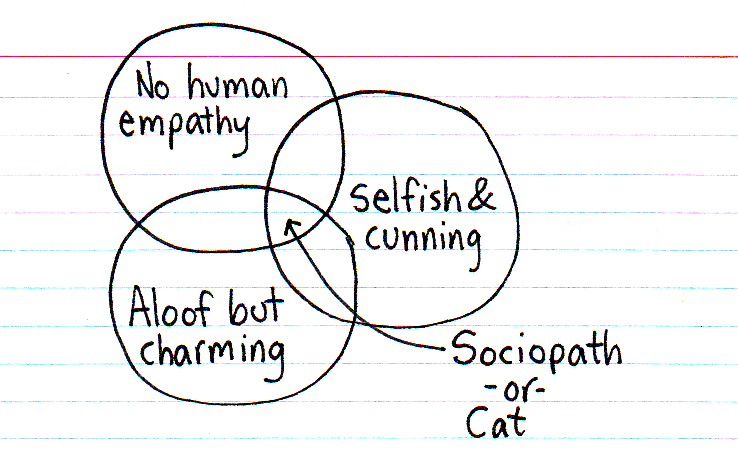 But not all sociopaths are found in prison.
But not all sociopaths are found in prison.
There is the less-visible burden of sociopath-induced emotional trauma which, if left unchecked, can lead to anxiety disorders, depression and post-traumatic stress disorder. Chronically traumatised people often exhibit hypervigilant, anxious and agitated behaviour, symptoms such as tension headaches, gastrointestinal disturbances,
abdominal pain, back pain, tremors and nausea.
Exposure to and interaction with a sociopath in childhood can leave lifelong scars. Th is can apply to people in therapy – and for those who in recovery trained as therapists, re-exposure as an adult can trigger old emotions and PTSD.
This article is not about sociopaths per se but about surviving the harm they cause.
Everyday sociopaths.
Many sociopaths wreak havoc in a covert way, so that their underlying condition remains hidden for years. They can possess a superficial charm, and this diverts attention from disturbing aspects of their nature. The following case history illustrates how people can be systematically targeted until they feel they can barely trust their own sense of reality – what we call “gaslighting”. Sociopathic abuse is targeted abuse. It can wreck lives. Victims
The following case history illustrates how people can be systematically targeted until they feel they can barely trust their own sense of reality – what we call “gaslighting”. Sociopathic abuse is targeted abuse. It can wreck lives. Victims
can become survivors, but at huge cost.
At school, ‘James’ took a dislike to a classmate, ‘Sam’, who was sensitive and popular.
He would mock him for auditioning for the school play or for getting upset over failing a test. The situation deteriorated when it became known that Sam’s parents were separating. Sam appeared to be taking it with fortitude, to the admiration of his peers. He also got attention and sympathy from the school staff , especially James’ favourite
teacher: ie, the one he manipulated most easily.
James decided on a plan of covert bullying. He started a whispering campaign implying that Sam’s parents were not splitting up, that he had said they were in order to seek attention. Sadly, this was all too successful and over the next few days Sam was met with silence and verbal bullying from his hitherto-supportive classmates.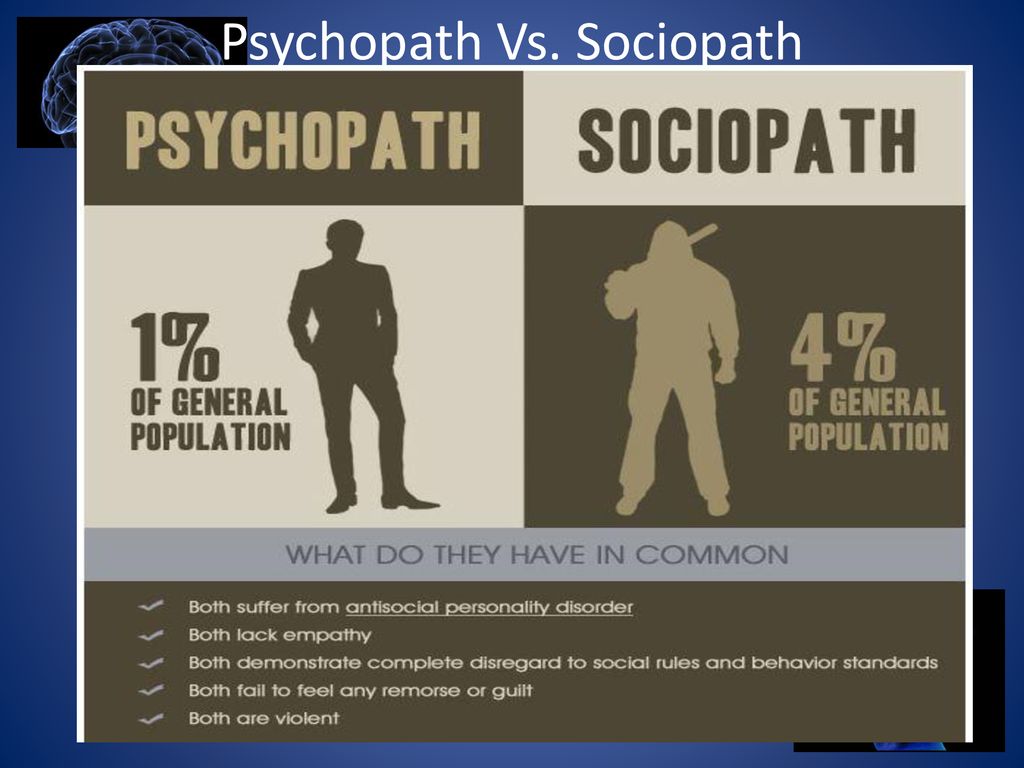 James continued his campaign, targeting Sam’s close friends over the next few days. They found themselves accused of misdemeanours such as sending offensive emails/texts. Then the ‘favourite’ teacher went on “leave with immediate effect” after accusations of assaulting a pupil. Where had the accusations come from? Guess.
James continued his campaign, targeting Sam’s close friends over the next few days. They found themselves accused of misdemeanours such as sending offensive emails/texts. Then the ‘favourite’ teacher went on “leave with immediate effect” after accusations of assaulting a pupil. Where had the accusations come from? Guess.
This case shows how deliberately sociopaths, from a young age, can target others. Taking
advantage of people’s credibility and goodwill, James exploited the situation. With a more
perceptive head teacher, this sociopath might have been found out, but he knew who to manipulate and how far he could go.
See the emperor/empress’s clothes.
To deal with sociopaths effectively, you first need to open your eyes. In The Emperor’s New Clothes by Hans Christian Anderson, two weavers promise the emperor a new suit of clothes that is invisible to those who are stupid and unfit for their positions. When the emperor parades before his subjects, all the adults, not wishing to be seen in a negative light, pretend they can see the clothes. The only truthful person is a child who cries “But he isn’t wearing any clothes!”. You, too, need to see sociopaths as they really are.
The only truthful person is a child who cries “But he isn’t wearing any clothes!”. You, too, need to see sociopaths as they really are.
We are conditioned to keep quiet, which often means turning a blind eye to or putting up
with abuse. The boy in the tale represents those who see the problem behaviour for what it is and find the courage of their convictions to make a stand. Sight becomes insight, which turns into action. Awareness is the first step in limiting the negative effects of contact with a sociopath.
Interactions of the sociopath.
Let’s look at what we term the Socio-Empath-Apath Triad, or Seat. Unremitting abuse of other people is an activity of the sociopath that stands out. To win their games, sociopaths enlist the help of hangers-on: apaths.
The apath. We call those who collude in the sport of the sociopath apathetic, or apaths. In this situation, it means a lack of concern or being indifferent to the targeted person.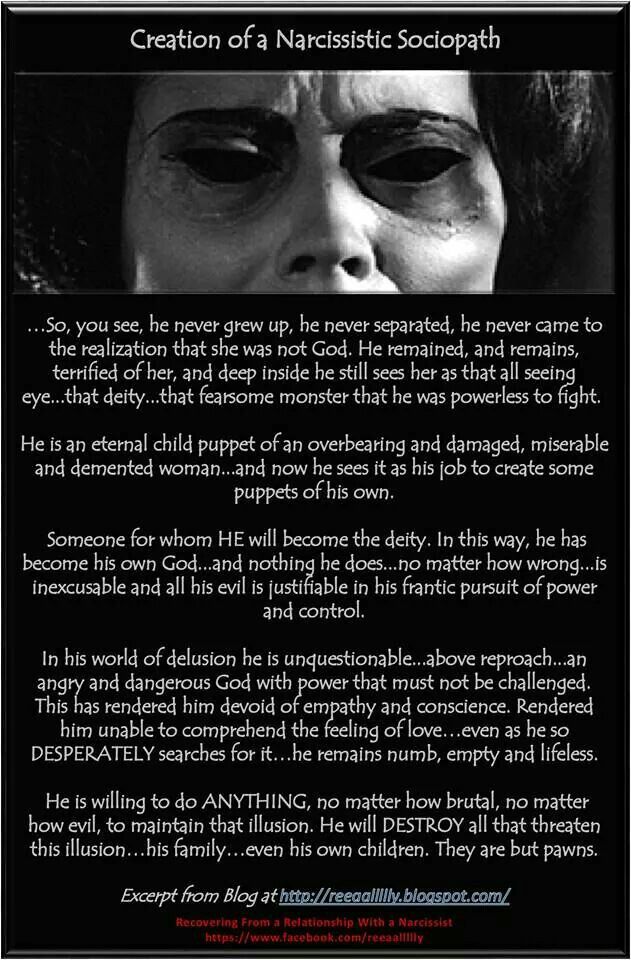
We have highlighted the importance of seeing the problem for what it is via the tale of
the Emperor’s New Clothes, which represents the collective denial and double standards which are often a feature of social life. The apath in this context is someone who is willing to be blind: ie, not to see that the emperor/empress is naked.
Apaths are an integral part of the sociopath’s arsenal and contribute to sociopathic abuse.
Sociopaths have an uncanny knack of knowing who will assist them in bringing down the person they are targeting. It is not necessarily easy to identify an apath; in other circumstances, an apath can show ample empathy and concern for others – just not in this case. The one attribute an apath must have is a link to the target.
How apaths, who might otherwise be fair-minded people, become involved in such
destructive business is not hard to understand, but it can be hard to accept. The main qualifying attribute is poor judgment resulting from lack of insight.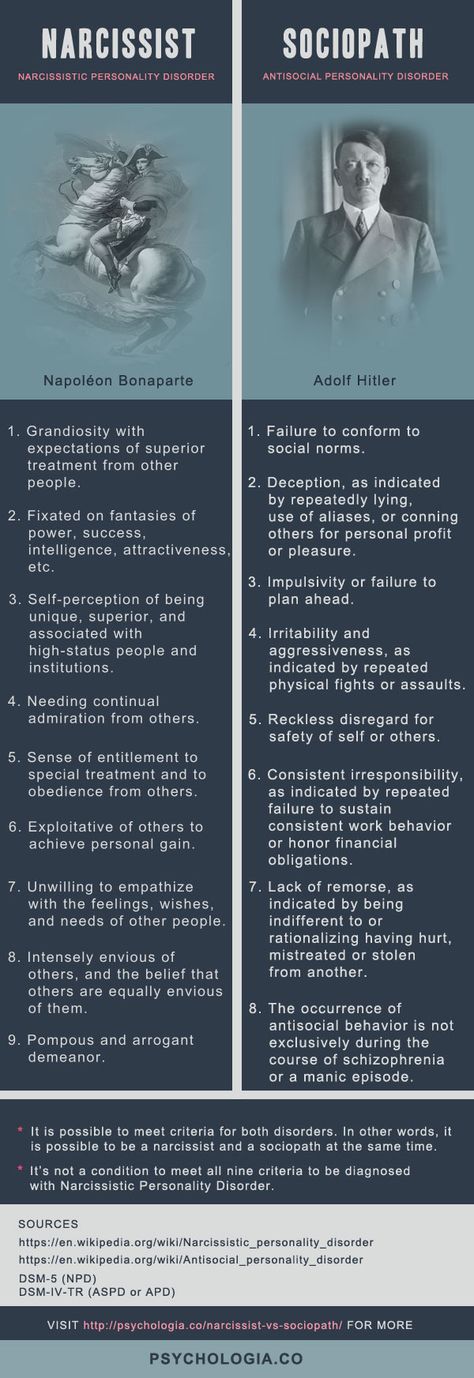 They might be jealous of or angry at the target, and thus have something to gain from the evolving situation.
They might be jealous of or angry at the target, and thus have something to gain from the evolving situation.
At other times, the apath might not want to see the ‘bad’ in someone, particularly if the
sociopath is useful. Or they might choose not to see because they have enough on their plate and do not possess the wherewithal or moral courage to help the targeted person at that time. Usually, be it active or passive involvement, the apath’s conscience appears to fall asleep. It is this scenario that causes people blindly to follow leaders motivated only by self-interest.
Readers might know of Yale University professor Stanley Milgram’s experiments to test the human propensity to obey orders, as participants gave increasingly large electric shocks to subjects. Afterwards, he wrote an article, The Perils of Obedience: “Ordinary people, simply doing their jobs and without any particular hostility on their part, can become agents in a terrible destructive process”.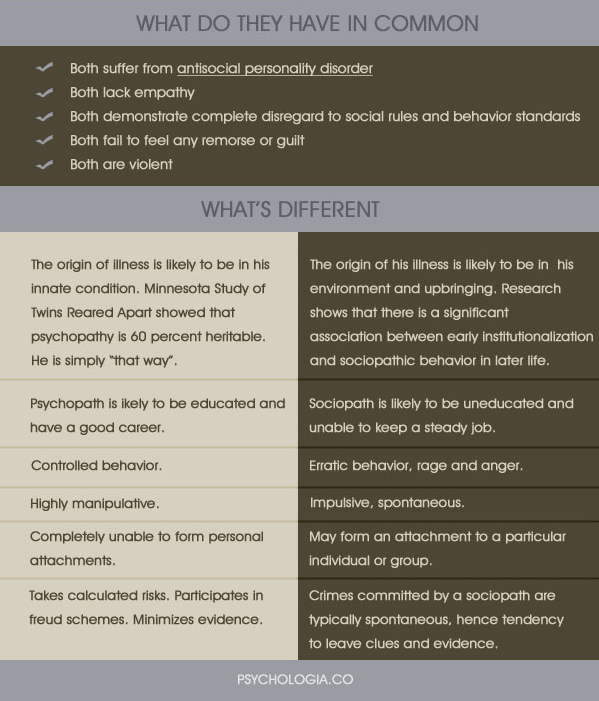
Apaths are often fearful people. They are the ones most likely to go with the fl ow, to agree that the emperor/empress is wearing new clothes. They might also fail to perceive the threat: a danger is of no importance if you deny its existence. An apath’s response to a sociopath’s call to arms can then result from a state of ‘learned helplessness’. Apaths behave defencelessly because they want to avoid unpleasant or harmful circumstances
[including the sociopath turning on them]. Apathy is an avoidance strategy.
The empath. Often, the person targeted by the sociopath is an empath. Empaths are ordinary people who are highly perceptive and insightful and belong to the 40% of human beings who sense when something’s not right, who respond to their gut instinct. In The Emperor’s New Clothes, the empath is the boy who mentions the unmentionable: that there are no clothes.
In the 1990s, researchers suggested that there was a positive relationship between empathy and emotional intelligence. Since then, that term has been used interchangeably with emotional literacy. What this means in practice is that empaths have the ability to understand their own emotions, to listen to other people and empathise with their emotions, to express emotions productively and to handle their emotions in such a way as to improve their personal power.
Since then, that term has been used interchangeably with emotional literacy. What this means in practice is that empaths have the ability to understand their own emotions, to listen to other people and empathise with their emotions, to express emotions productively and to handle their emotions in such a way as to improve their personal power.
People are often attracted to empaths because of their compassionate nature. A particular
attribute is that they are sensitive to the emotional distress of others. Conversely, they have trouble comprehending a closed mind and lack of compassion in others. Very highly empathic people can find themselves helping others at the expense of their
own needs, which can lead them to withdraw from the world at times.
It is odd. Most of us enjoy watching films and reading books about heroes who refuse to
go along with the crowd, which suggests there is something admirable about people who make a bold stand. But in real life, watching someone raise their head above the parapet often makes the rest of us feel queasy.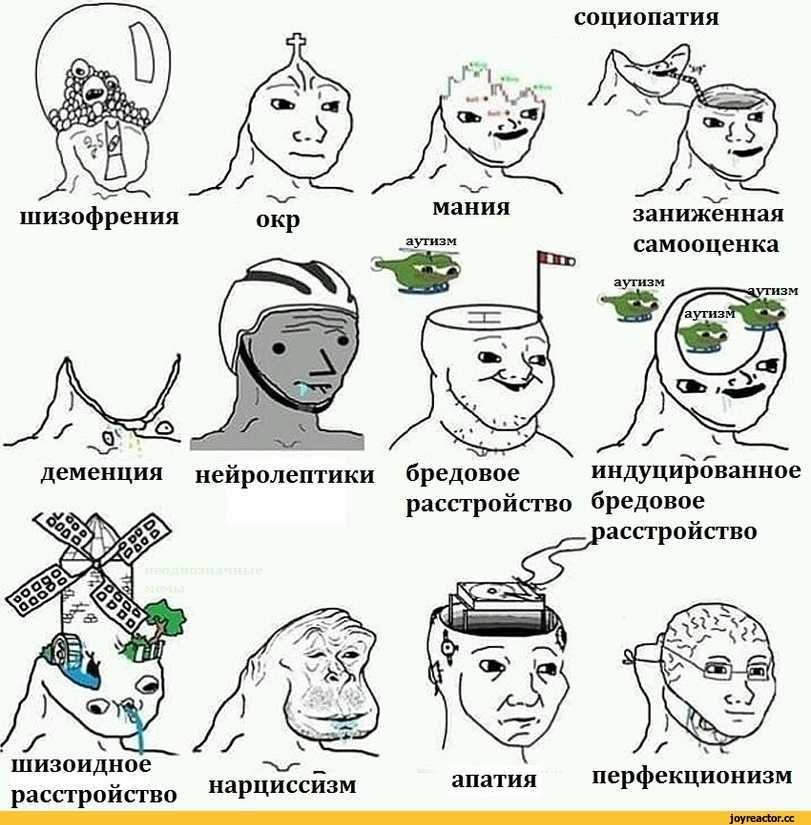 Most – the 60% majority – prefer the easy life. It was interesting to discover, when doing the research for this book, how often people see empaths in problematical terms.
Most – the 60% majority – prefer the easy life. It was interesting to discover, when doing the research for this book, how often people see empaths in problematical terms.
Empaths use their ability to emphasise and to boost theirs and others’ wellbeing and safety. Problems arise for empaths, however, when there are apaths in the vicinity. Empaths can be brought down, distressed and forced into the position of the lone fighter by the inaction of more apathetic types round them.
The sociopathic transaction.
Often empaths are targeted by sociopaths because they pose the greatest threat. The empath is usually the first to detect that something is not right and express what s/he senses. As a consequence, the empath is both the sociopath’s number one foe and a source of attraction; the empath’s responses and actions provide excellent entertainment for sociopaths, who use and abuse people for sport.
The world of the empath is not for the faint-hearted.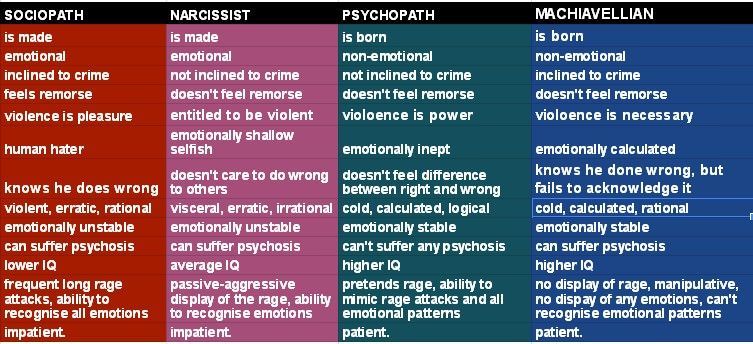 In the context we are discussing,
In the context we are discussing,
empaths often find themselves up against not only the sociopath but often a flock of apaths as well. Apaths are afforded pole position in the sociopath’s intrigues. But this prime spot comes at a price for, in what we call the “sociopathic transaction”, the apath makes an unspoken Faustian pact with the sociopath, then passively or otherwise participates in the cruel sport.
Sociopath-empath-apath triad.
The usual set-up goes like this: the empath is forced to make a stand on seeing the sociopath say or do something underhand. The empath challenges the sociopath, who straight away throws others off the scent and shifts the blame on to the empath. The empath becomes an object of abuse when the apath corroborates the sociopath’s perspective.
The situation usually ends badly for the empath and sometimes also for the apath, if
their conscience returns to haunt them or they later become an object of abuse themselves. But, frustratingly, the sociopath often goes scot free. Sociopaths rarely vary this tried-and-tested formula because it virtually guarantees them success.
But, frustratingly, the sociopath often goes scot free. Sociopaths rarely vary this tried-and-tested formula because it virtually guarantees them success.
Sociopaths draw in apaths by various means: flattery, bribery, disorienting them with lies.
A sociopath will go to any lengths to win her game. The best way to illustrate the interplay, and the ease with which apaths are pulled in, is by another short story.
‘Steve and Robin’ were microbiologists at a prestigious university, collaborating on an
important vaccine trial. The department head, Ben, hoped to gain substantially; success could see his status in his field rise and prove the catalyst for a glittering career. His colleagues worked relentlessly collecting data, then Ben drafted a paper for submission to
a respected journal. He decided that the outcome didn’t look tantalising, so falsified key results in order to present findings in the best light.
On completing the draft, he sent the paper for comment to his colleagues.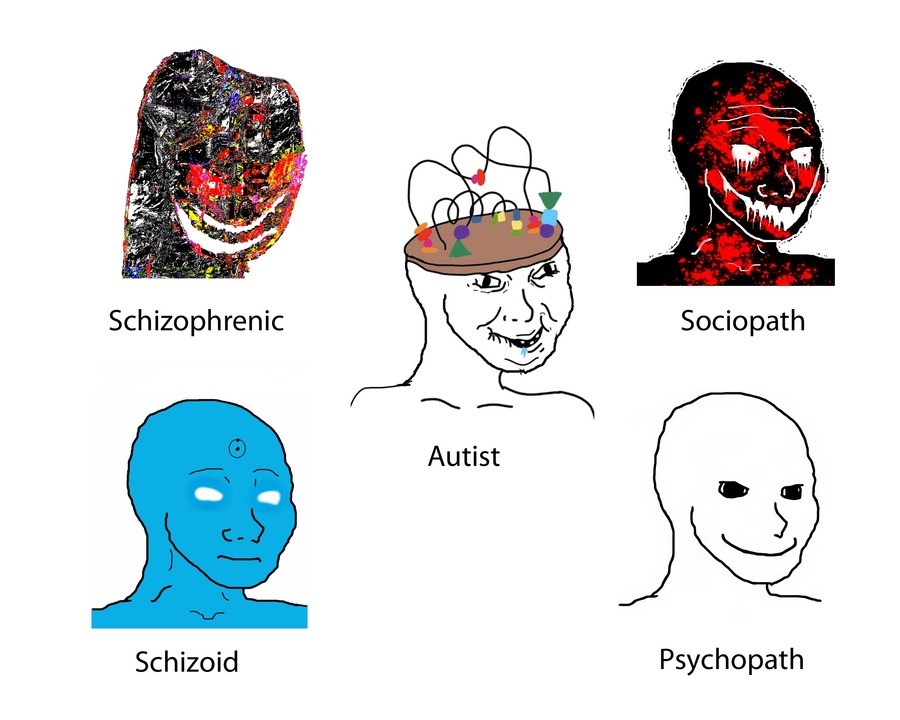 Steve replied by email that he was happy with the manuscript; he used the opportunity to suck up to his boss. But Robin was aghast, noting colossal errors. With great urgency, he rattled off an email to Ben. Receiving no response to this or a phone call, Robin went to find Ben in person, discovering him in the cafeteria with Steve. But he was too late. Ben had poisoned Steve’s mind, saying that Robin had challenged him over the accuracy of
Steve replied by email that he was happy with the manuscript; he used the opportunity to suck up to his boss. But Robin was aghast, noting colossal errors. With great urgency, he rattled off an email to Ben. Receiving no response to this or a phone call, Robin went to find Ben in person, discovering him in the cafeteria with Steve. But he was too late. Ben had poisoned Steve’s mind, saying that Robin had challenged him over the accuracy of
the results, due to a longstanding grudge. Ben said he had to pull Robin up about his own work several months back. Steve was different, Ben implied. He intimated Steve would be on course for promotion “especially if we get this paper out and secure funding for the next-stage trials”. By the time Ben joined them, Steve, though initially shocked, had been won over by Ben’s swift flattery and insinuations.
Robin crossed the cafeteria to them. “Hi, you two got a moment?” Briefly there was an
awkward silence. Steve exchanged a look with Ben, who gave a slight conspiratorial smile, now that the transaction was done and the sport under way.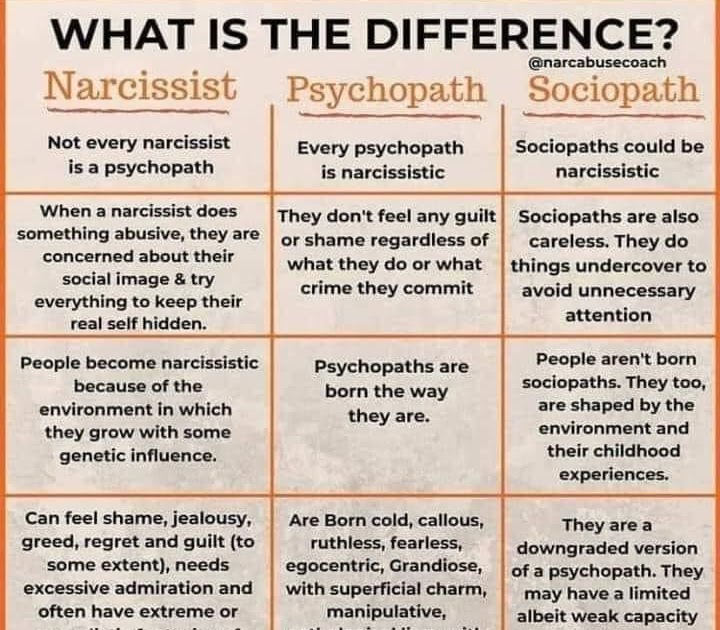 “Yes, we were just talking about the paper. By the way, I did see your email, but if you look at the paper thoroughly, I think you’ll find that everything is correct.” Steve replied with a smug look that “I’m with Ben on this one”. Robin was floored. “You can’t be serious? You’re happy for it to go off to be reviewed with all these serious errors? Our reputations will be left in ruins.”
“Yes, we were just talking about the paper. By the way, I did see your email, but if you look at the paper thoroughly, I think you’ll find that everything is correct.” Steve replied with a smug look that “I’m with Ben on this one”. Robin was floored. “You can’t be serious? You’re happy for it to go off to be reviewed with all these serious errors? Our reputations will be left in ruins.”
He decided to make a stand. He asked for his name to be removed as a co-author but
was exasperated to learn that it was sent off to the journal anyway. More frustratingly, it was published. Meanwhile, the workplace became a source of stress for Robin as he struggled to cope with the backlash from colleagues who saw his intervention as an attempt to sabotage their work. People avoided him and, when they did talk to him, the conversation was stilted.
Eventually Robin arranged a meeting with Ben to have it out once and for all. But Ben
took control of the agenda. “Robin, I have to be honest with you, many of your colleagues are unhappy about the way you handled things and some have made complaints. They don’t trust you to conduct yourself professionally after you attempted to sabotage their hard work. Mercifully the reviewers saw what a fine trial we’d conducted and didn’t get wind of your attempted slur.
They don’t trust you to conduct yourself professionally after you attempted to sabotage their hard work. Mercifully the reviewers saw what a fine trial we’d conducted and didn’t get wind of your attempted slur.
“We can’t afford to have a saboteur on the team. So I’ve discussed this with the dean and he agrees there is no future for you here, and there’s no other way to deal with this. You’ve got to go.” Any phase of this story sound familiar?
The gaslighting effect.
In the story above, the actions of Ben and Steve have a ‘gaslighting’ effect on Robin.
Gaslighting is a systematic attempt by one person to erode another’s reality. The syndrome gets its name from the play and films of the same name in which a murderer strives to make his wife doubt her sanity and others to disbelieve her.
Gaslighting is a form of psychological abuse in which false information is presented in such a way as to make the target doubt his/her memory and perception. Psychologists call this “the sociopath’s dance”. It could involve denial or staging of strange events.
It could involve denial or staging of strange events.
This is Machiavellian behaviour of the worst kind. And anyone can become a victim of the
sociopath’s gaslighting moves: parent and child, in-laws, friends, groups of people including work colleagues.
Psychotherapist Christine Louise de Canonville describes different phases that the
abuser leads the relationship through:
- the idealisation stage, where the sociopath shows herself in the best possible light – but this phase is an illusion, to draw her target in
- the devaluation stage begins gradually so the target is not alert to the sociopath’s transformation to being cold and unfeeling, but will begin to feel devalued at every turn; the more distressed the target becomes, the more the sociopath enjoys her power, and her abuse can become more extreme
- the discarding stage – the target is reduced to an object to which the sociopath is indifferent, seeing the game as won; the sociopath rejects any connection, moving on to the next target.
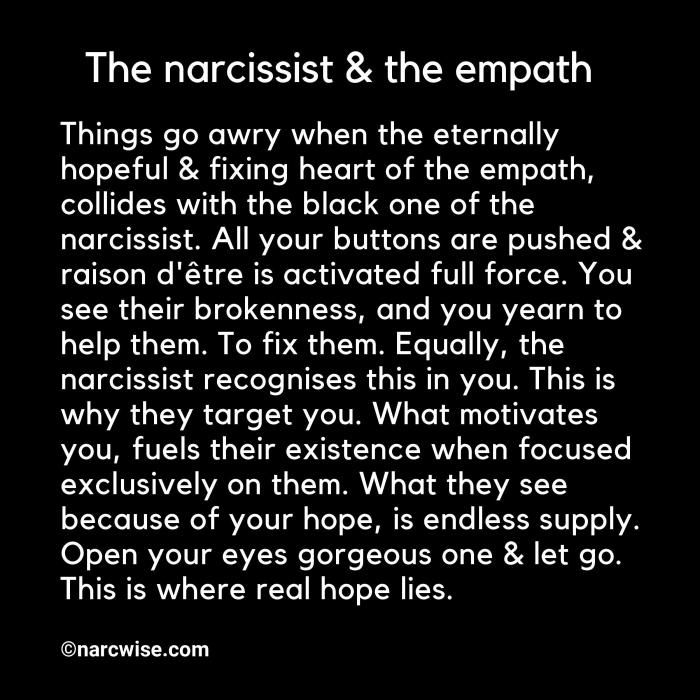
Gaslighting does not happen all at once so, if you suspect in the early stages of a relationship that you are being gaslighted, you can protect yourself by walking away.
To learn more, including how to recover from exposure to a prolonged sociopathic transaction, buy The Empathy Trap: Understanding antisocial personalities by Dr Jane and Tim McGregor (Sheldon Press, ISBN 978-1847092762).
Empath and sociopath - what is their difference, comparison of signs
An empath is a person who is able to empathize with other people. He feels other people's emotions and heartache as his own, and can even guess the thoughts of strangers. Empathy can be voluntary, but sometimes it happens involuntarily, especially for people who are natural empaths.
How to recognize an empath
1. The ability to empathize. Even before the person tells how they feel, the empath already knows about it. In addition, he can simply enter the room and feel the general mood of the environment. nine0003
nine0003
2. Moral support. Anyone who is suffering, experiencing emotional pain, or being bullied in any form needs moral support. Someone else's misfortune almost immediately attracts the sympathy and attention of an empath. He just can't ignore when he feels or sees someone in trouble.
3. The desire for solitude. Being around people can drain an empath, so they need to be alone occasionally to recharge their batteries. Even short-term solitude prevents him from emotional overload. nine0003
4. Other people turn to him with their problems. Empaths are usually like magnets for people in need of moral support. Both strangers and friends are drawn to someone who empathizes with them. Empaths are able to feel, listen and understand what they are going through without judgment.
5. Developed intuition, inner voice. Intuition is the ability to understand something instinctively, without the need for conscious reasoning. An empath perceives the world through the lens of intuition. It is very important for such a person to develop his sixth sense, as it helps him to understand people and build relationships with them. nine0003
It is very important for such a person to develop his sixth sense, as it helps him to understand people and build relationships with them. nine0003
Read also : How to develop intuition on your own - 10 exercises.
6. Reluctance to appear in crowded places. Public facilities such as stadiums, concert halls, supermarkets, malls, cinemas, and fairs are harmful to empathetic people. Usually they try to avoid appearing in the crowd, because they are bombarded with too many different emotions and feelings coming from strangers.
7. Many of them are introverts. Empaths tend to be introverted and prefer one-on-one interactions or small groups. nine0003
An important note: even if an empath is an extrovert (a friendly person who enjoys socializing and being with other people), they prefer to limit the time they spend in a crowd or at a party.
Features
What distinguishes an empath in society? Here is a list of traits characteristic of the behavior of an empathetic person:
- Eases the pain of others by taking it, then feeling exhausted; nine0044
- Smells, sounds, and low energy levels can overwhelm it;
- This is a good listener;
- He sensitively feels the connection with the subtle world;
- Gives more than he can receive in return;
- Strives to retire in nature;
- Absorbs the emotions of other people;
- Becomes an easy victim of narcissists, chronic talkers and energy vampires;
- Quickly tunes in to the same wavelength with other people; nine0044
- Can sense when something is wrong;
- Easily lost in intimate relationships.

This is a brief description of a pronounced empath, but it gives a clear idea of \u200b\u200bthis type of person. Many seek to hide their feelings under deliberate rudeness and indifference, but deep down they remain sensitive and vulnerable.
Signs of a sociopath, characteristic features
The medical term for sociopathy is antisocial personality disorder. Sociopathy is in the same category as borderline personality disorder, as well as narcissism (narcissism, selfishness). Do not confuse this term with " social phobia "- fear and hostility towards people.
According to the International Directory of Classification of Diseases, a sociopath is defined as a person who universally ignores and violates the rights of others.
How is a person prone to sociopathy recognized? We list the main features of such an individual:
1. Ability to manipulate. Sociopaths are masters of manipulation; this is one of the main and common tricks in their "luggage".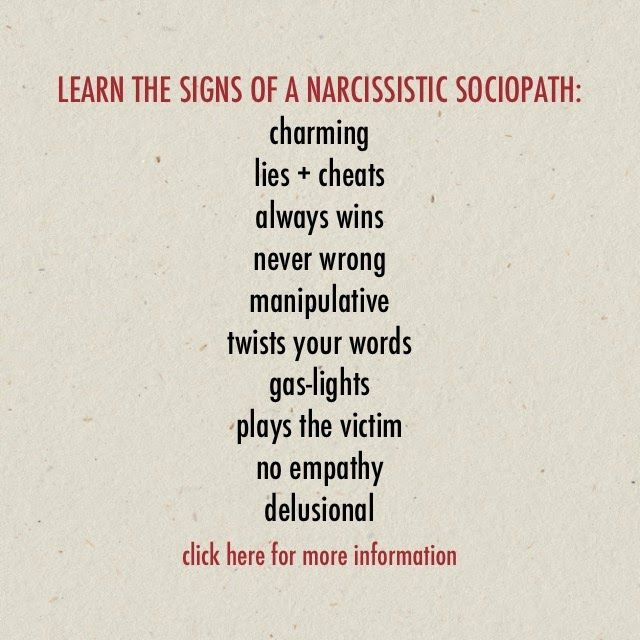
2. Tendency to lie. Sociopaths are experts at deception because it comes naturally to them; in fact, many of them probably don't remember when they started lying. Their lies tend to be self-serving, so they ring true. In addition, many sociopaths themselves sincerely believe in the stories they invented. nine0003
3. High intelligence. Sociopaths usually place a high value on intelligence and education, and seem to be knowledgeable in many areas. It is almost impossible to meet an unsophisticated simpleton sociopath, because for him the main thing is manipulation, and only smart people can manipulate others.
4. Self-admiration. Although narcissism itself is a personality disorder, this quality is also characteristic of sociopaths. It's hard not to notice narcissistic behavior, as sociopaths show strong admiration and love for their person. As a rule, this is due to low respect for other people. nine0003
5. Impulsivity. Spontaneous acts, a tendency to act or do something without forethought.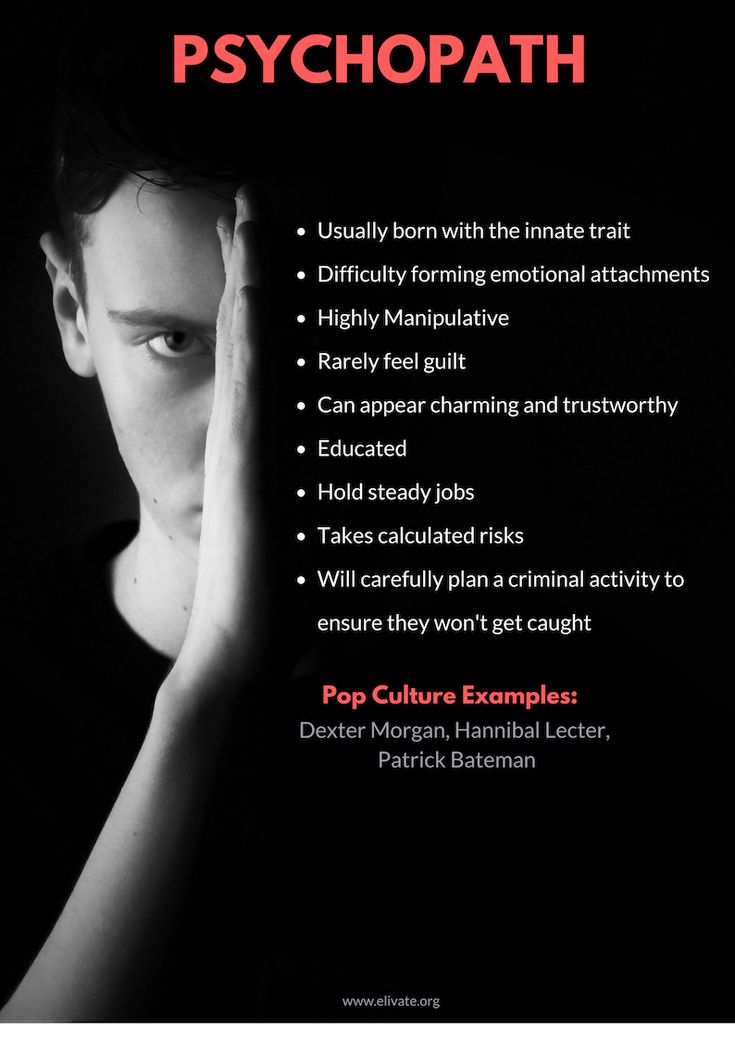 A sociopath may have difficulty coping with impulsive behavior.
A sociopath may have difficulty coping with impulsive behavior.
Please note: Impulsivity is seen in some psychiatric conditions, including mania, attention deficit/hyperactivity disorder, and substance abuse disorders.
6. Lack of empathy. One of the most prominent symptoms of antisocial personality disorder is a lack of empathy. In response to the feelings of another person, a sociopath demonstrates:
- Severity
- Coldness
- Over-criticism
- Callousness, indifference
- Insensibility
7. Charm. A sociopath can be friendly and very charismatic because he knows that this way he can get what he wants. In addition, he often quotes books or films - this is because, despite his manipulation skills, he never had an original thought of his own.
8. Narrow social circle. A sociopath usually doesn't have many real friends due to being very narcissistic and often hurting people. nine0003
9. Parasitic way of life.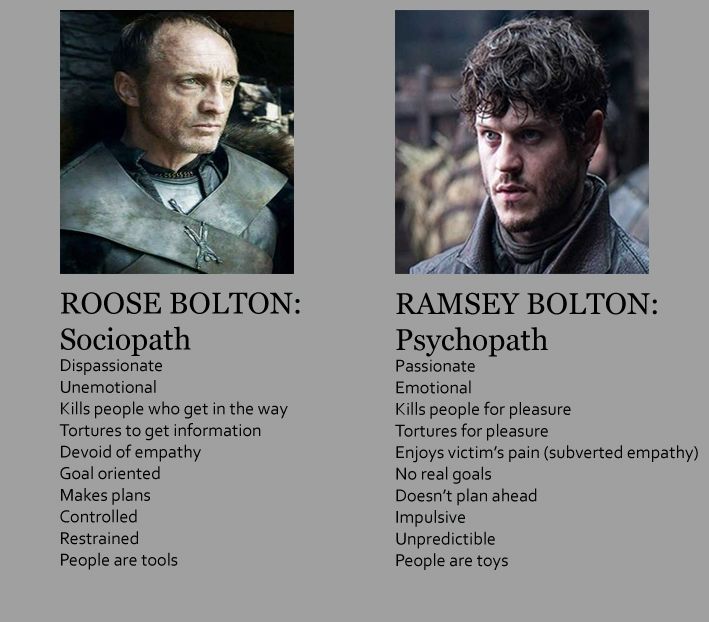 He exhibits a manipulative, willful, exploitative, selfish, and financial dependence on others, which translates into low self-discipline, lack of motivation, and an inability to perform duties.
He exhibits a manipulative, willful, exploitative, selfish, and financial dependence on others, which translates into low self-discipline, lack of motivation, and an inability to perform duties.
10. Extremely high self-esteem. A sociopath may consider himself a worthy ruler of a country, but, nevertheless, he may also have delusional beliefs, such as having superpowers or believing himself to be God.
Common Traits of a Sociopath:
- Lack of remorse;
- Ignoring social norms;
- Failure to meet financial obligations;
- Problems with law;
- criminal behavior;
- Reckless disregard for safety;
- Arrogance;
- Failure to learn from negative consequences;
- Lying, using pseudonyms or repeating lies;
- abusive relationships; nine0044
- Aggressiveness, likes physical fights, fights without rules, etc.;
- Hostility;
- Irritability;
- Inability to plan ahead;
- Deceiving others for pleasure or personal gain.
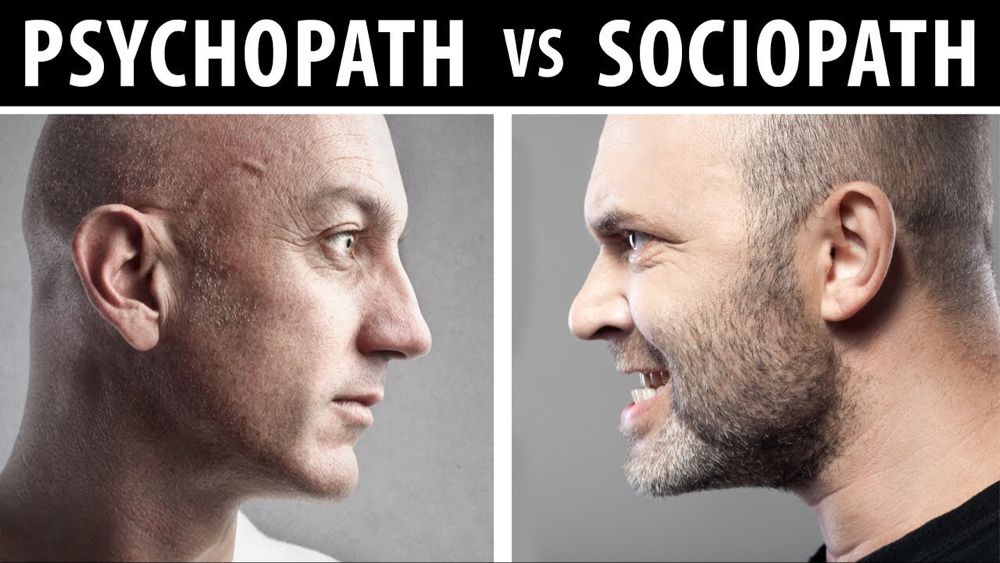
Bottom line - empath vs. sociopath
Empaths are people who capture and absorb the emotions of others, "pass through themselves." The reverse side of empathy is vulnerability and the inability to defend against targeted aggression, energy vampirism. nine0003
"Sociopath" is an informal term often used to refer to a person suffering from antisocial personality disorder. This disorder is characterized by a lack of remorse or shame, disregard for the feelings of others, uncontrollable egocentrism, manipulative behavior, and the ability to lie to achieve one's goals.
Dealing with a sociopath can be mentally and emotionally draining, depending on how developed the relationship is.
victims, sociopaths are predators, apaths are fertile soil / Blog them. Sirin / Dolgoprudny's most visited site
Empaths are easy prey for sociopaths who seek the help of what researchers Jane and Tim McGregor called "apates."
Victims of sociopaths often blame themselves: “I was stupid”, “what was I thinking”, “I should have listened to my own intuition”.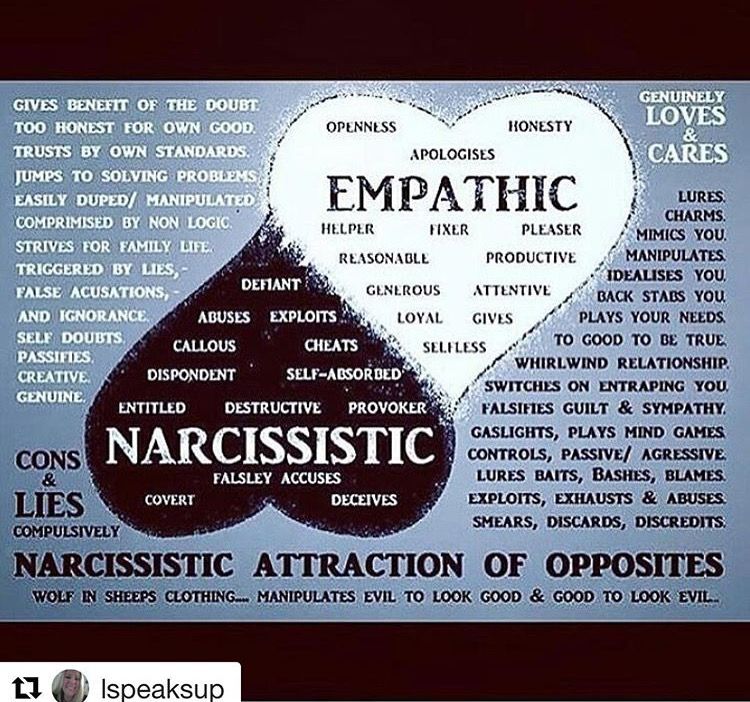 But we must not forget that sociopaths lure their victims with brainwashing. Sociopaths have a superficial charm with which they seduce people. nine0003
But we must not forget that sociopaths lure their victims with brainwashing. Sociopaths have a superficial charm with which they seduce people. nine0003
During the dating phase, sociopaths often test people for empathy, so questions about how much you can empathize with others are red flags. A person with a high degree of empathy is at risk. Sociopaths are indifferent to people with a low level of empathy, although they can also use them for their own entertainment.
Psychopaths can cause severe emotional trauma that leads to anxiety disorders, depression and PTSD if left unaddressed. Chronic injuries cause hypervigilance, restlessness, and agitation, as well as symptoms such as headaches, gastrointestinal disturbances, abdominal pain, back pain, tremors, and nausea. nine0003
Exposure to and interaction with a sociopath in childhood can leave unhealed wounds in the soul for life. This article is not about sociopaths per se, but about the harm they cause.
SOCIOPATHS IN EVERYDAY
Many sociopaths are able to hide their disorder, so their diagnosis may not be obvious for many years. They may have a superficial charm that diverts attention from the disturbing manifestations of their nature. nine0003
They may have a superficial charm that diverts attention from the disturbing manifestations of their nature. nine0003
The following story illustrates how people become victims of systematic bullying that causes them to distrust their own sense of reality—what we call "gaslight." Sociopathic abuse greatly spoils the life of the victim. Victims of abuse can heal, but at the cost of great effort.
James took a dislike to a classmate named Sam, who had a sensitive nature and was popular with his peers. James bullied him during his school theater auditions, rejoicing when Sam got bad grades. The situation escalated when it became known that Sam's parents were getting a divorce. The resilience and courage with which Sam experienced personal troubles was admired by his classmates. Sam was sympathized and sympathized with the teachers, especially the teacher, who was under the influence of James - he knew how to manipulate her. nine0003
James has developed a plan for covert bullying.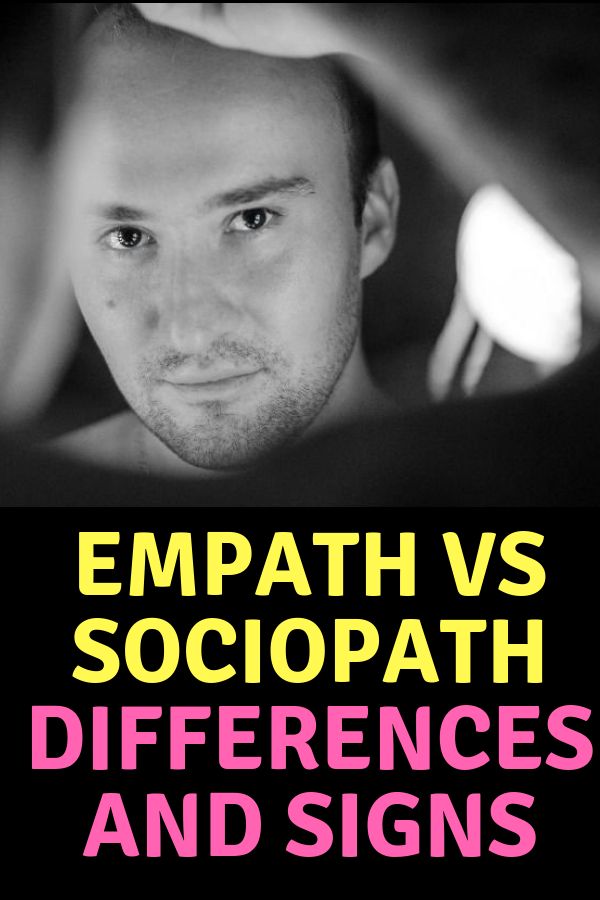 He started with a smear campaign, telling everyone that Sam's parents weren't going to get divorced at all, that Sam started such a rumor to get attention. Unfortunately, the gossip was believed, and soon the classmates who used to support Sam began to boycott him and mock him. During the ensuing time, James continued his campaign of bullying Sam with the help of close friends. They started sending insulting emails and texts to Sam. And the “beloved” teacher, after complaining about bullying, suggested that the children “figure it out for themselves”. Who did the bullying come from? Well, you get the idea. nine0003
He started with a smear campaign, telling everyone that Sam's parents weren't going to get divorced at all, that Sam started such a rumor to get attention. Unfortunately, the gossip was believed, and soon the classmates who used to support Sam began to boycott him and mock him. During the ensuing time, James continued his campaign of bullying Sam with the help of close friends. They started sending insulting emails and texts to Sam. And the “beloved” teacher, after complaining about bullying, suggested that the children “figure it out for themselves”. Who did the bullying come from? Well, you get the idea. nine0003
This case demonstrates that sociopaths start bullying their victims at a young age. Having abused the trust and kindness of others, James took advantage of the situation. If the teacher had been a more perceptive person, perhaps he would have brought James to clean water, but James understood who could be manipulated and how far he could go in this.
SEE THE NAKED KING
To learn how to deal with sociopaths, you must first open your eyes wide.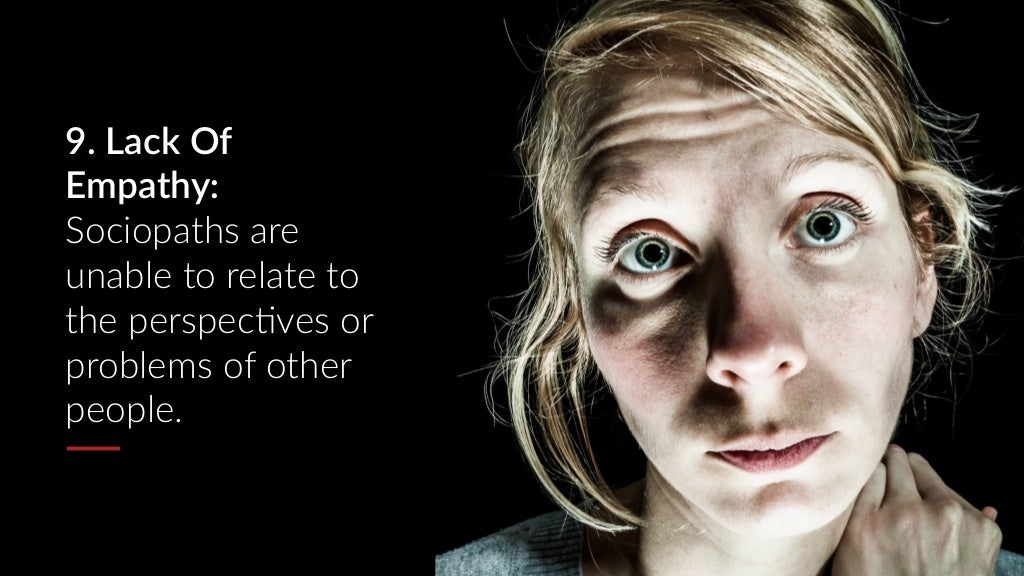 In Andersen's fairy tale "The King's New Clothes," two tailors promised to make the king a smart new suit that would remain invisible to fools or those unfit for office. When the emperor went naked in front of people, his subjects, adults, were afraid that they would be considered fools or inappropriate for their position, and therefore pretended to see the king in a new dress. The only person who dared to tell the truth was a child who exclaimed, "But the king is naked!" nine0003
In Andersen's fairy tale "The King's New Clothes," two tailors promised to make the king a smart new suit that would remain invisible to fools or those unfit for office. When the emperor went naked in front of people, his subjects, adults, were afraid that they would be considered fools or inappropriate for their position, and therefore pretended to see the king in a new dress. The only person who dared to tell the truth was a child who exclaimed, "But the king is naked!" nine0003
You too should see sociopaths for what they really are. We tend to keep quiet, close our eyes, or put up with violence. The boy from the fairy tale is a symbolic figure that personifies people who notice destructive actions and, holding firm convictions, find the courage to declare it publicly. Wide-open eyes help to understand and express your attitude to what is happening. Recognition becomes the first step in dealing with sociopaths.
INTERACTION WITH SOCIOPATHS
Let's take a closer look at the Empath-Sociopath-Apath triad.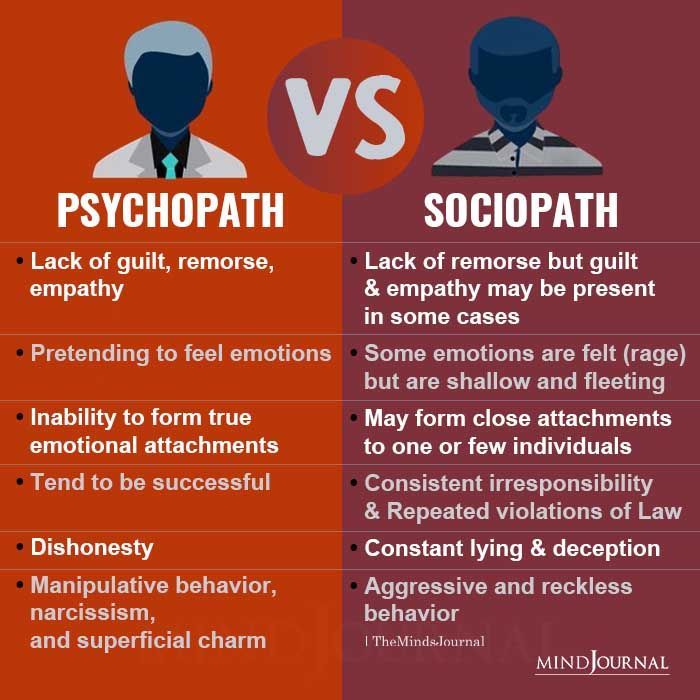 Sociopaths are active in bullying people, and this is what they stand out for. To play their game, sociopaths resort to the support of apaths. So, we call apaths those who support sociopaths. In this case, we mean people who show indifference towards the victims.
Sociopaths are active in bullying people, and this is what they stand out for. To play their game, sociopaths resort to the support of apaths. So, we call apaths those who support sociopaths. In this case, we mean people who show indifference towards the victims.
We have mentioned how important it is to identify the problem, to call a spade a spade - as in a fairy tale about the king's new dress. To turn a blind eye to the behavior of a sociopath is to display the collective denial and double standards that are often present in social life. Apats are people who are ready to be blind not to admit that “the king is naked!”. nine0003
Apats are constant participants in sociopathic games and contribute to the commission of abuse. Sociopaths are good at predicting who is ready to help them in bullying, who they can rely on. Identifying apaths is not always easy: some of them are able to show sufficient empathy and concern for others, it is important to understand how apathetic they will be in this particular case. One of the signs of apathy is its attitude towards a potential victim.
One of the signs of apathy is its attitude towards a potential victim.
In the vast majority of situations, apaths may be sensible, but once they become involved in destructive strategies, they may understand this, but they cannot admit it. The main symptom of apathy is short-sightedness, arising from a lack of insight. They may be jealous or angry with the victim, and thus be interested in bullying them. nine0003
In addition, apaths are often reluctant to “think bad of people,” especially sociopaths who benefit from such complacency. Or they may really not notice the destructiveness, because some negative qualities are present in themselves and they do not have enough moral courage to admit that the sociopath began to poison the victim.
Apaths are actively or passively involved in destructive scenarios because they do not want to wake up. It is this motive that drives people to blindly follow leaders who are driven solely by selfish considerations. nine0003
Readers may be familiar with an experiment conducted by Yale University professor Stanley Milgram. The purpose of the study was to test the readiness of people to obey orders - to give increasingly stronger electric shocks to the subjects. The result was an article on the dangers of obedience: "Ordinary people who simply do their job without feeling much hostility towards anyone can be involved in a process that has terrible destructive power."
The purpose of the study was to test the readiness of people to obey orders - to give increasingly stronger electric shocks to the subjects. The result was an article on the dangers of obedience: "Ordinary people who simply do their job without feeling much hostility towards anyone can be involved in a process that has terrible destructive power."
Apatas are often afraid of other people. They are the ones who are more likely to go with the flow, agreeing that the naked king is wearing a new smart dress. They may also not perceive threats: danger does not matter if you deny its existence. You can become an apath as a result of the state of "learned helplessness" that sociopathic abuse leads to. Apathas refuse to confront violence because they want to avoid unpleasant or dangerous situations [including those involving sociopaths]. Apathy is an avoidance strategy. nine0003
Sociopaths often target empaths. Empaths are ordinary people who have a strong receptivity and good intuition - their number is approximately 40%.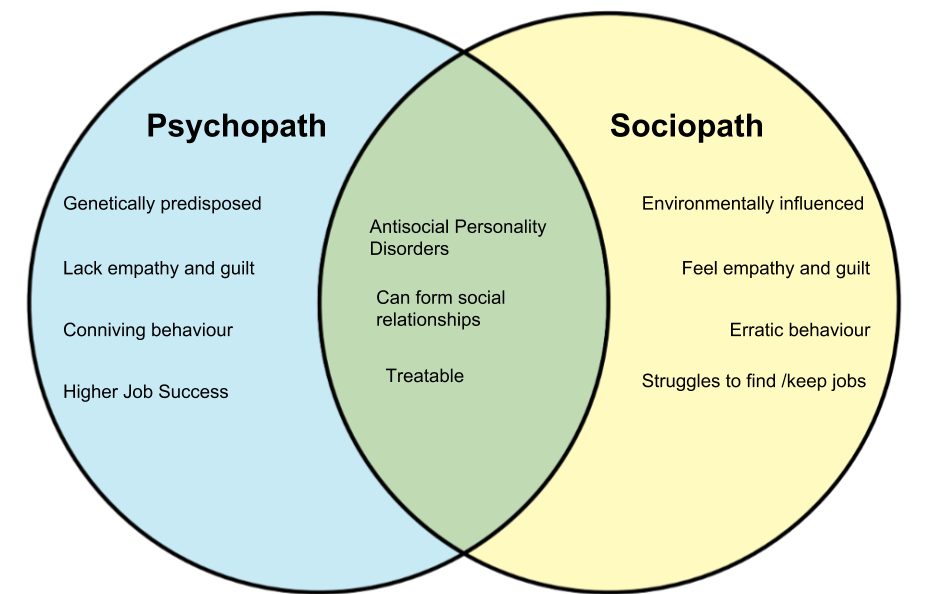 These are people who feel when “something went wrong”, as their inner instinct tells them. In the fairy tale about the king's new dress, the empath is the same boy who speaks out loud the ugly truth: the king is naked!
These are people who feel when “something went wrong”, as their inner instinct tells them. In the fairy tale about the king's new dress, the empath is the same boy who speaks out loud the ugly truth: the king is naked!
In the 1990s, studies were carried out that revealed a connection between empathy and emotional intelligence. Since then, the term has been used as a synonym for "emotional literacy". In fact, it means that empaths have the ability to understand their own emotions, feel and empathize with other people, adequately express their emotions and deal with them productively. nine0003
Empaths often attract people with their ability to empathize. The hallmark of empaths is their ability to be sensitive to the emotional experiences of others. And, on the contrary, they have problems understanding people who are closed, without a sense of compassion. Highly empathic people may take on the principle of helping others at the expense of their own needs, which can lead to disconnection from the real world.
Strange. Most of us love to watch movies and read books about heroes who are not afraid to go against the crowd, we admire the courage of these daredevils. But in real life, the situation when someone raises their head above the parapet often makes us sick. Most people - 60% - choose the easy life. It was interesting to learn from the study how often people see empaths in difficult situations. nine0003
Empaths use their abilities to identify and enhance their own and others' desires for well-being and security. However, when apaths appear near an empath, problems arise. An empath can be drained of blood, disoriented, and forced to stand as a lone fighter against the indifference of an apathetic crowd.
DEALING WITH SOCIOPATHS
Empaths are often targeted by sociopaths because they are the biggest threat to sociopaths. Empaths are usually the first to detect that “something went wrong” and focus on their own feelings. As a result, not only is the empath the number one enemy of the sociopath, but the emotional reactions of empaths and their willingness to act become a great entertainment tool for sociopaths who bully people for fun.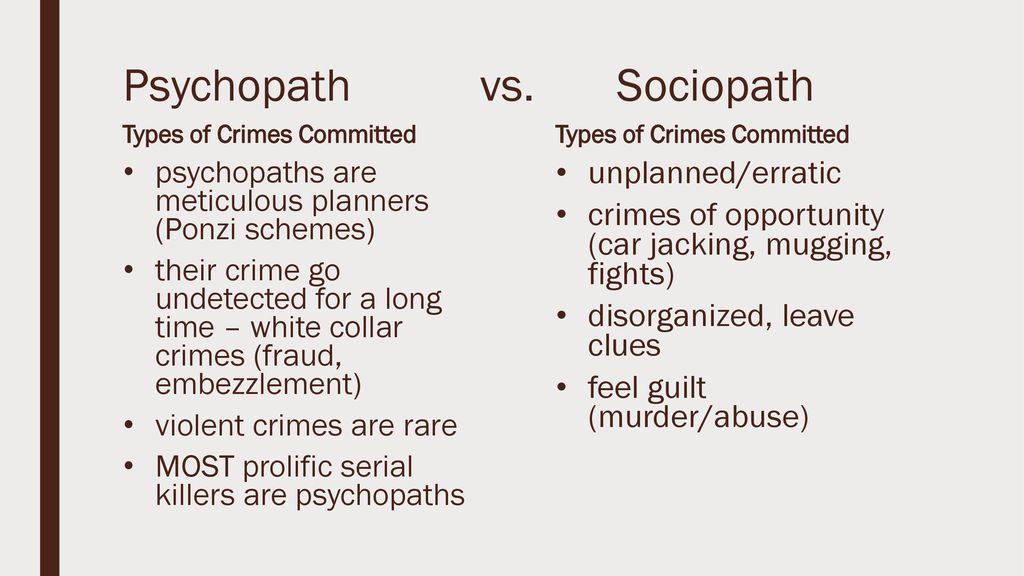 nine0003
nine0003
The world of the empath is not for the faint of heart. In the context of our article: empaths often turn out to be opponents not only of sociopaths, but are often forced to confront also a crowd of apaths who form a field for the deployment of sociopathic intrigues. The calmness of apaths is achieved at a too high price, the so-called "crazy deal" - an apat signs an unspoken Faustian agreement with a sociopath on non-resistance or participation in sociopathic games.
SOCIOPAT-EMPAT-APAT TRIAD
The usual disposition is as follows: an empath versus a sociopath who is forced to act on the sly. The empath has already figured out the sociopath, and he throws others on the wrong track and turns the arrows on the empath. An empath is bullied when a sociopath convinces others of their point of view.
The situation usually ends badly for the empath, and sometimes also for the apaths, who become remorseful, or if the apaths subsequently also become the target of sociopath bullying.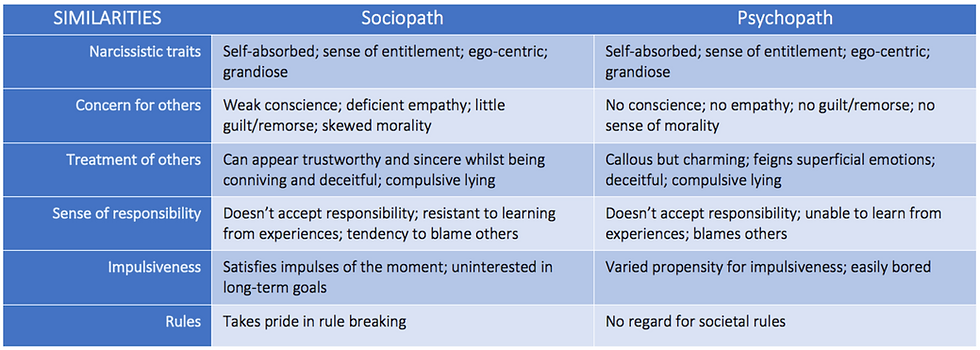 But, unfortunately, the sociopath often gets away with it. Sociopaths rarely deviate from this tried-and-true scenario because it guarantees them almost 100% success. nine0003
But, unfortunately, the sociopath often gets away with it. Sociopaths rarely deviate from this tried-and-true scenario because it guarantees them almost 100% success. nine0003
Sociopaths attract apaths to their side in various ways: flattery, bribery, disorientation with lies. A sociopath will do anything to win his game.
GESLITE EFFECT
Gaslight is a systematic attempt by one person to destroy another person's reality. Gaslight takes its name from the film of the same name (Gaslighting), in which a murderer seeks to make his wife doubt her own sanity and force others to disbelieve her. nine0003
Gaslight is a type of psychological abuse in which lies are used to make the victim doubt their own mental abilities and perceptions. Psychologists call this "sociopathic dancing." Gaslighting can be done through the denial of real facts or the demonstration of strange accidents. This is Machiavellianism at its worst. Anyone can become a victim of sociopathic brainwashing: the aggressor can be a parent or child, a husband, friends, groups of people, including work colleagues.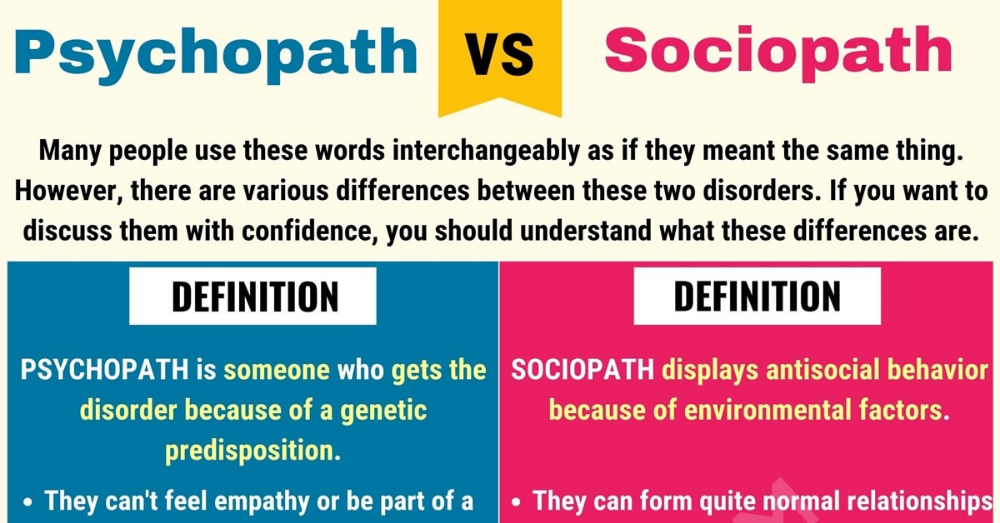 nine0003
nine0003
Psychotherapist Christine Louise de Canonville outlines the following stages in the sociopath's relationship with his victim.
Idealization - the stage at which the sociopath shows himself in the most favorable light, creates the illusion of a good relationship with the victim in order to draw him into his game.
Devaluation - occurs gradually, so that the victim does not immediately notice a change in attitude towards the sociopath, who becomes more and more cold and insensitive, but begins to feel less and less valuable at every step; the more confused the victim feels, the more intense the sociopath's pleasure in feeling his own power, and his cruelty may increase. nine0003
Disposal - the victim becomes an object to which the sociopath is indifferent, since he has already won his game; the sociopath breaks the connection and turns his attention to the next victim.
Remember that gaslighting happens gradually, so if you suspect manipulation early in the relationship, you can save yourself by cutting ties with the manipulator.